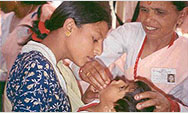Overview
Welcome to the USAID Global
Health Web Site
Read a Statement by President Obama on the Global Health Initiative - 05/05/09
USAID programs in global health represent the commitment
and determination of the United States
Government to prevent suffering, save lives,
and create a brighter future for families in the developing
world. USAID's commitment
to improving global health includes confronting
global health challenges through improving the quality,
availability, and use of essential health services. USAID's
objective is to improve global health, including child, maternal, and reproductive health, and reduce abortion and disease, especially HIV/AIDS, malaria, and tuberculosis.
USAID's Global Health Bureau supports field health programs, advances research and innovation in selected areas relevant to overall Agency health objectives, and transfers new technologies to the field through its own staff work, coordination with other donors, and a portfolio of grants and with an annual budget in fiscal year 2007 of nearly $4.15 billion. Global health issues have global
consequences that not only affect the people of developing
nations but also directly affect the interests of American
citizens.
American
Schools and Hospitals Abroad (ASHA) administers a worldwide
grant program that expands medical opportunities in developing
countries. The program fosters public-private partnerships that
strengthen medical centers while demonstrating American ideas
and practices abroad.

Read the biography of Gloria Steele, USAID Acting Assistant Administrator for Global Health
|
Visit the INFO Project Web Site
With funding from USAID, the INFO Project houses a large library of resources available to family planning, reproductive health, and population audiences. INFO's One Source database helps visitors search through thousands of documents, articles, photos, communications materials, online communities, and Q&As available to health care practitioners. Visit INFO | Order or Download Immunization Essentials
Available in English, French, and Spanish, Immunization Essentials: A Practical Field Guide is produced by USAID and provides technically and operationally sound information for immunization program managers in developing countries and for people who support them. Read more |
 |
 |
 |
Environmental Health
USAID aims to provide global leadership in the development, implementation, and promotion of new and improved interventions to reduce illness and death in children caused by environmental factors. |
 |
Family Planning
USAID's family planning program is one of the success stories in U.S. development assistance. Since the launch of the program in 1965, families are better able to feed, clothe, educate, and provide health care for their children. Countless women and children are alive today as a result of USAID assistance. |
 |
Health Systems
USAID's health systems strengthening program provides support to ensure that developing country health systems are effective, efficient, and equitable.
Health systems strengthening is a continuous process of implementing changes in policies and management arrangements within the health sector. |
 |
HIV/AIDS
As part of the U.S. President's Emergency Plan for AIDS Relief, USAID carries out HIV/AIDS prevention, care, and treatment programs in nearly 100 countries around the world. |
 |
Infectious
Diseases
USAID launched its Infectious Disease Initiative
in 1998 with the support of the U.S. Congress.
The Initiative focuses on prevention, treatment,
and control of new and re-emerging infectious diseases
such as malaria and tuberculosis, while building
surveillance capacity and addressing antimicrobial
resistance. |
 |
Maternal and Child Health
USAID is committed to improving the health and well-being of children and families. Immunization, polio eradication, nutrition, diarrhea and pneumonia care, and maternal and neonatal health are fundamental components of USAID's maternal and child health program. |
 |
Nutrition
Nutrition programs implemented by USAID and its partners have helped to decrease hunger and serious malnutrition rates throughout the developing world. |
|


